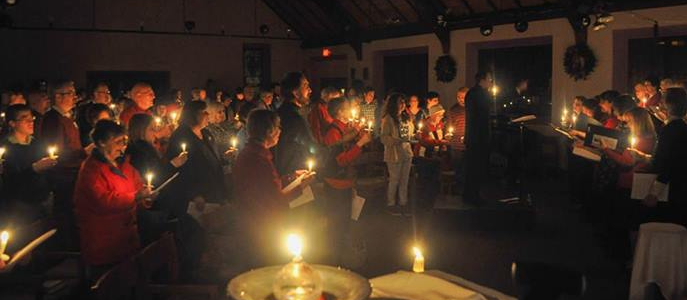Christmas services are right around the corner.
The kids’ choirs are practicing their songs. UPS is scheduled to drop off the candles for the candle lighting by the end of the week. The special Christmas songs are already in PCO. Christmas service prep is fully in motion!
As all these special elements come together, I want to draw our attention to the people attending our services.
We must remember, everyone coming to our Christmas services are at different places in their walk with the Lord. Some are seasoned believers, others are brand new to the faith. Some are struggling in their faith while others are completely outside the faith altogether.
We must intentionally think about these 4 different groups of people and ask ourselves, “How is our Christmas service meeting them where they are?”
If everything catered to the seasoned believer, then those who are new to the faith or aren’t Christians at all will feel lost and potentially confused. If the whole service spoke to the on fire believers, then those asking questions and struggling in their faith could leave feeling even more isolated and alone.
Here’s something that we must remember: it’s human nature to cater towards where we are at personally.
Naturally we create things that most resonate with what we are passionate about, what we think, and what best connects to our story. So if you’re an on fire lover of Jesus, that’s the primary lens you’ll think and create through. But great leaders think beyond their lens and seek to reach everyone.
Achieving this, however, is definitely one of those good old-fashioned “easier said than done” kind of things. So today our hope is to connect you with ways your Christmas service can have a significant touchpoint with all 4 of those different groups of people.
1) The Seasoned Believer
Within this group of people are a huge variety of experiences. Those that have been around their faith for a long time and are fired up about celebrating the newborn King. You’ll also find individuals that wouldn’t be classified as struggling in their faith, they’re confident in Jesus Christ as the Messiah, but maybe the fire has subsided a bit.
For these individuals, it’s important that we remind them of the wonder of the Messiah.
The wonder of how we have direct access to Emmanuel, God with us, that has opened the door for us to live and walk in new life. The transformation, the healing, everything present in our lives, is because of the life of Jesus.
For the seasoned believer, let’s create moments of looking behind us at all that God has done throughout our past that can’t keep us from singing out o’come let us adore Him.
2) New Believers
No matter who you are, my point in the first section applies. Let’s fill these people with wonder and gratitude for all the Lord has brought them through to get here. But in addition to this, new believers have this amazing opportunity to be introduced to the depths of the Christmas story. So connect them with the beautiful language that we see in Silent Night, declaring “chains shall he break for the slave is our brother and in his name all oppression shall cease.”
At Christmas we have an amazing opportunity to continue to shape and reshape the understanding of those who are new to Christiantiy.
So take time to share why we are singing so many songs that celebrate the coming of the Messiah. Share how for so long the people of God were waiting on the promised Messiah to arrive. Some had completely lost hope and feared it wasn’t true and then He came in Jesus.
When we take time to explain the meaning and significance of the season, it connects those who are new to the heart of God in an even deeper way.
3) The Unbeliever
To keep in theme with the previous point, all of the above applies here too. Those outside the faith will more than likely be coming in with vague and minimal experiences with the songs, the traditions, and story. So how can you breathe new life and reveal the beauty of what they might already be familiar with?
In addition to these things, how can you connect to their story to make them feel comfortable?
I remember when I was a kid I went and visited my friend’s church for their Christmas service. The church service was extremely different than my church’s typical format. Tons of sitting and standing. At one point we left our seat to go up to the front to take communion out of this massive cup. All the people in front of me were doing different hand motions and saying all these different things. I was so anxious that I was going to do something wrong and stick out like a sore thumb.
And sure enough I did. The pastor turned his head in confusion when I got to the front of the line and then smirked. I felt like everyone around me was starring at me as I wrongly grabbed the cup and shrugged. Needless to say, I spent the service wishing I could climb underneath the pew in front of me and disappear.
We have to remember that we have tons of people coming to our Christmas services that have never been to our churches before. So let’s think through how we can make them comfortable.
Even simple things like letting them know what the service is going to look like. “You might see people raising their hands and getting excited. Well that’s because…” or “Today we’re going to sing a few songs, hear a short encouraging word from our pastor, watch the kids perform a special song, etc. During all that we want you to feel comfortable. So sit if you want to, sing along or not, keep your hat on, whatever allows you to feel comfortable. We are so stoked that you’re here and want you to know that this is your home.”
This might feel excessive, but making accommodations for these individuals to feel comfortable will allow them to have a beautiful experience, free of distraction and filled with uninterrupted encounter.
4) The Struggling Believer
To state it plainly, there will be people in your church services this year who are struggling. Whether it be tragedy, a crisis of faith, some painful things that Christmas brings up in their heart – there are people in real need that don’t want to sing Joy to the World.
The worst thing we can do for those who are struggling is create a service that overlooks where they’re at.
So genuinely, what can you do in your Christmas service to let these people know they’re not alone?
A few years ago, I wrote a song for our Christmas service that explicitly talked about being tired and without hope in the midst of a season that’s supposed to bring joy to the world. It was brutally honest and it didn’t resolve with a nice cute bow. At the end of the Christmas service weekend we were flooded with messages at how much it meant to so many people, who were coming into church that weekend struggling. It expressed to them that there was a place for them in our community.
When we acknowledge the things people are walking through & create space for it to exist in our gatherings, it teaches people that all of who they are is welcomed and safe.
Here’s the thing, they are already struggling. People are already coming in with heavy loads. Failing to acknowledge those things doesn’t make them go away. In some cases it only further isolates people. What sounds more like Jesus than creating a space for people to come into His presence truly as they are?
Now you don’t have to write a song that talks about the struggle.
But what if you took 30-seconds before you go into All Hail King Jesus to say, “For some of you, these words are really hard to sing. Know that God is with you in it, we are with you in it, and you are why the Messiah came. To draw near to you as Emmaunel, God WITH us. Even if He feels further than the moon, know He’s with you today!”
There are so many things you can do to reach these different groups of people at your Christmas service this year.
The point of this post is not to give you a step by step of the best ways to reach these 4 different groups of people. It’s simply for us as leaders to remember all who are coming. So that we can craft a Christmas service that creates significant moments for all.
Worship Leader, last thing to remember as you step into your Christmas services
There are people coming into your services who need what your community is presenting. And so in the midst of all the special planning and things, please know you are changing people’s lives. You are breathing fresh oxygen into weary souls. You are increasing the revelation of the Messiah in the hearts and minds of so many. What you do is significant. So, in the chaos may purpose strengthen your bones as you lead a community of people to adore the King of Israel.
Article written by: Josh Kluge
Article taken from here.
Find more blogs like these at MinistryJobs.com/blog




